#but you know my name is ray
Explore tagged Tumblr posts
Text

1 note
·
View note
Text



WHAT ARE WE.
#genshin spoilers#genshin impact spoilers#the thing calling itself enjou#i'm deadnaming him for convenience's sake if he's not happy about it he can tell us his actual name#there's several named lectors through the story i know he has one#anyway what are we#why is he like this and how do we get him to never stop#seeing him again was the highlight of the whole patch and he fully lived up to it#enjou i missed you SO MUCH#does he also talk like that in chinese because i can hear what he says but i certainly don't understand the words#all i can do is read the text and hope it's faithful#genshin#ray's records#enjou are you trying to negotiate for something to be deep down inside you#and why is it entirely unclear whether it's supposed to be my sword or my di- who said that
58 notes
·
View notes
Text
I headcanon that at first Ray is adamantly against the use of nicknames and pet names for himself because he thinks it's silly.
"My name is Ray. It's literally three letters and one syllable long. Just call me Ray."
But Emma can't let that stand. She has "sunshine" and "Em," Norman has "Nor," "Norm," and "Boss."
So her proposed solution is for Ray to change his name so that "Ray" can be a nickname and show of affection. Ray balks at the suggestions she litters throughout their conversations, addressing him as Raymond, Rayner, even Raybert at one point.
Norman is more deft in his timing so the first time he drops a "Raymond" during one of their chess matches he ends up on the receiving end of Ray channeling Isabella with this look
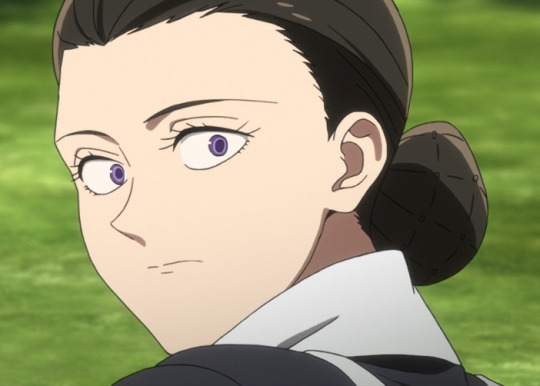
He does eventually come around to them calling him Sunray.
#“Ah‚ to be greeted every morning by the two loves and lights of my life 🧡🖤” / “It's too early for this‚ Norman.”#“Raymond works the best because then we all have that second-syllable 'm' sound going on‚#but Rayner has your name plus all of our initials…” / “Stop.”#literally the largest jump of a tangent from Ruby's 𝘌𝘷𝘦𝘳𝘺𝘣𝘰𝘥𝘺 𝘓𝘰𝘷𝘦𝘴 𝘙𝘢𝘺𝘮𝘰𝘯𝘥 edit kdfjgdkj#He is 𝘴𝘰 easy to rile up#but tbf he makes it easy‚ when it comes to them 🧡🖤🤍#Idk if he'd even make an “I'm leaving you” joke at Norman's attempt after everything they've been through at this point#like m'guy you were literally willing to die for them for six years before you even hit double digits#they know your ass isn't going anywhere dkjfhjk#peak comedy is after not saying anything about it for years is this being the way Norman figures out the Isabella-Ray bio connection#The Promised Neverland#TPN#Post-Canon#Norrayemma#Noremray#Emma#Norman#Ray#FSS Chatter#FSS Shenanigans#TPN S1#TPN S1e08#Escape Arc#Emma will also sometimes call him Sleepy Cyclops but that's meant to be more of a sweet callback
114 notes
·
View notes
Text
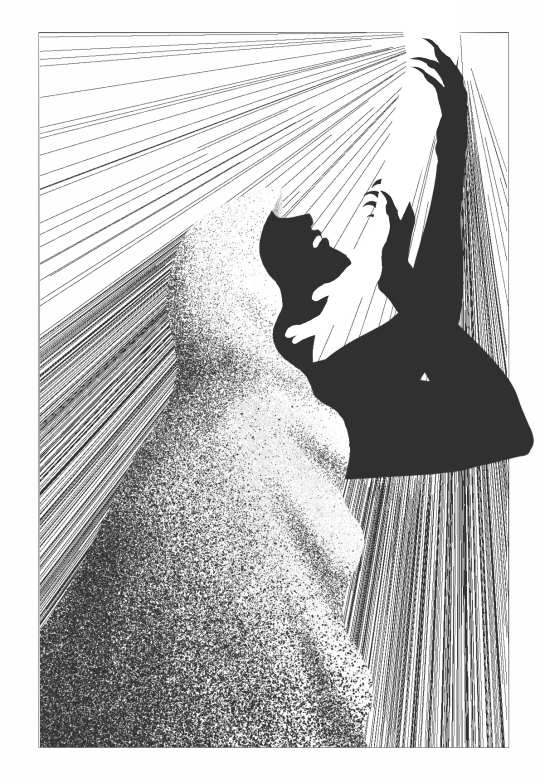
redraw (light mode users try clicking it! dark mode users there's a solid version below)

My favorite tags from @borealiszero that gave me the strength to finish this

#orv#omniscient reader's viewpoint#secretive plotter#art tag#ink#i wanted to draw the Plotter crying but i realized that with the silhouette i. i didn't know where his eyes were#but anyways yeah it's a lot easier to get the image i want digitally#especially that border#very important#it's implied in the original post but i felt like drawing it traditionally would make it stand out too much.#the original drawing is smaller than my palm. no room for details really#i was wondering whether i should have one of his claws reaching beyond the border but just his elbow is enough#the file name for this is 'holy elbow' because of that and because the origin of the light rays is the white hand's elbow.#as for who the white hand is#well they're drawing him out. you can interpret that sentence in a number of ways#but they're definitely not a part of his canvas. not drawn in the same ink. but their presence or lack thereof is felt#and maybe by his reaching for that person he begins to fill the empty space in their world#maybe by becoming a constellation they can share space on the canvas with him
71 notes
·
View notes
Text
Rayman if he was EMO!!1!11
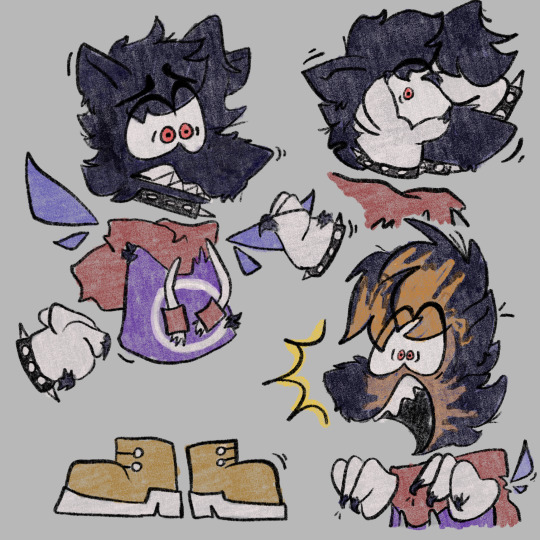
Obviously, I'm joking. So, like, you know how Rayman is mostly Lums and stuff? Y'know how he gets health via Red Lums?
What if he gets spooked enough, his Red Lums turn into Black Lums???
The issue is that you need to scare him BAD. And I mean bad. Like, shit his pants punching hold through monitor scared.
Also, this form is extremely unstable. Rayman is built on light, so when it turns into dark, he becomes extremely fragile and shaky.

Also, Rayman doesn't remember anything while in this form. And he's in it like, 5min max. It's always in short burst, so it's a blink or you'll miss it sorta deal.
When Rayman is in this form, he either fights or flights (he freezes when he's scared normally)
When he flees, you won't see him for like, a day or 2 then Rayman would come back all willy nilly.
If he fights, well some part of you is getting ripped off <33
He's also super fast, so this creature sorta became an urban legend. Something to scare the kiddies from going out into the jungle alone.
(Globox and Rayman probably went hunting for it once or twice)
#fun fact. his fur feels like fiberglass#the more you know <3#but sorry for my rambling#i like this idea very much#i dont actually have a name for this form#sorta just called it Hoodlum Ray or Hood Ray atm#so im open for ideas#rayman#fanart#digital art#rayman fanart#rayman origins#rayman legends#rayman 3#hoodlum#lums#werewolf sorta not really???#the transformation is never consistent#Hoodlum Rayman#< gonna tag this as that until i find a better name#globox#doodles#rayman globox#rayman games#i must confess but i feel like a monster core
79 notes
·
View notes
Text
I'm so sorry Sebastian likers but I've started referring to him as Eustace in my head.
#oh god some of my mutuals aren't gonna like this#one day new fans are going to come in and they're going to play the port and not know anything about the fan translation and only refer to#them with the official names and we are going to have to accept that.#you will not catch me calling him Sebastian in 10 years I'm sorry but eventually no one's going to know who we're talking about and#it's better to go through the five stages of grief and get to acceptance now rather than later#ace attorney#Justine I'm already calling Verity just because I can never remember her fan translation name anyways lol#the one I'm having the hardest time remembering is Eddie for Ray#like I think Eddie is a good name for him I just can't get it to stick in my brain#eustace winner#sebastian debeste#aai2
24 notes
·
View notes
Text
Dug up an old conversation with @hydrachea




#childe#tartaglia#so much is wrong with us#ray's words of wisdom#if abyss be thy name I pledge to you my loyalty#not saying this will happen#I know it won't#I just like the plot
71 notes
·
View notes
Text
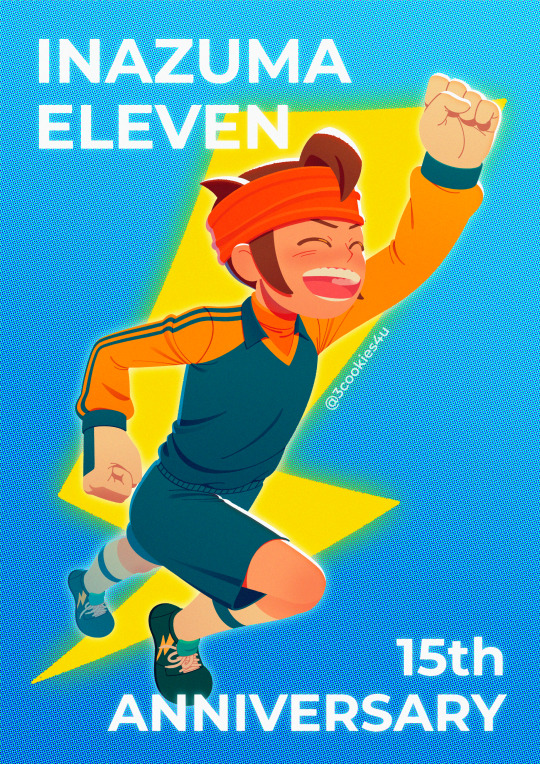
[ID: A digital piece of fanart showing Mamoru Endou from Inazuma Eleven in his original Raimon goalkeeper uniform. He's jumping forward with one fist raised up and smiling with his eyes closed and mouth open. Behind him is a yellow lightning bolt which loosely matches the shape of his pose. The text "Inazuma Eleven" is written on the top-left area of the image, while "15th anniversary" is on the bottom-right, both in white and all-caps. The background is light blue with a halftone texture. End ID]
happy 15th anniversary to ina11 and happy bday to endou!! i love this series so much- it was one of my biggest childhood obsessions and i still cherish it <3
#inazuma eleven#ina11#endou mamoru#mamoru endou#mark evans#(< i found out this year that the characters have eng names and it feels so bizarre)#my art#eyestrain#(just in case?? i don't know if it counts as such but the colors are pretty bright and saturated)#as a child i didn't care much about endou but i began liking him more after rewatching the anime recently#he's such a ray of sunshine#anyway. if you need me i'll be rewatching ina11 and listening to the openings and endings on loop
69 notes
·
View notes
Text
A Fight Taken To Heart: How Edward Teach Became a Queer Ally in Honor of Charles Vane
This piece was originally written for the fantastic @blacksailszine, which unfathomably came out over a year ago (and you should check it out if you haven't!). Somehow, I managed to procrastinate posting this here for that long, which is asinine. Especially because I'm actually very proud of it!!!
The news about Ray Stevenson today has me emotional (of course) and thinking again about how his performance as Blackbeard had a great impact on me. In his honor, it feels like a fitting day to finally share my tribute to his character on this blog.
Without further ado... please enjoy my meta below 🖤
--------------
The first time we see Edward Teach’s eyes, they’re framed in a mirror with a heart carved above it. Within the context of a scene designed to convey that Teach is a figure who commands fear and respect, this seems to be a curious choice for an introductory shot. Yet, much like many details placed throughout Black Sails’ meticulous narrative, the mirror’s design is poetic in hindsight because Teach’s heart was his ultimate motivation.
Over the course of multiple scenes, the first half of season 3 introduces us to both the pillars of who Teach is as a character and the primary characteristics of his relationship with Charles Vane. Taken as a whole, the picture painted of Teach’s presence in the story is that he acts as a metaphor for heterosexuality, toxic masculinity, and tradition. We learn that Teach had nine wives over the course of eight years, at least partially because he is motivated by the desire for a son. He glorifies strength above weakness, and he defines strength as superior physicality, independence, and sufficient leadership. He reminisces about the original state of Nassau in his youth, in which the standard was an enforced masculinity, powered by the notion that “one had to prove his worth.” And as he says to Vane and Jack in 3x02, in his view,
“You have taken away the one thing that made Nassau what it was. You have given her prosperity. Strife is good. Strife makes a man strong.”
Upon his introduction, Teach sees only the small picture of Nassau, not its place in the bigger picture of the world. He looks upon a Nassau rich in monetary plunder, preparing to come to its own defense or go to war, and he sees the ease in which men can typically join any crew as a marker of a lack of conflict. What he fails to take into account is that the primary strife now originates externally rather than internally because it is the strife of oppression, and that the solidarity that results from that strife creates its own version of strength.
”Why are you so determined to defend Nassau?” he asks Vane in 3x02, because the island is no longer anything special to him. “A lion keeps no den,” he tells Vane in 3x05, “Because the savanna, all the space within it. . . belongs to him.” Teach is not beholden to Nassau for haven or home, because he was able to assimilate into civilization whenever he had cause or desire. He married multiple women, flew under the British flag, and even spoke their “language” of flag codes (3x10). While Teach is certainly a pirate, it is by choice rather than survival.
As a result, he cannot understand the importance of true solidarity amongst the oppressed–and thus, Nassau’s defense–because he’s never needed it, as a straight white man who’s never been limited by oppression. And because this is a narrative where piracy is arguably a metaphor for queerness, filled with characters who do not have the luxury or desire to play by civilization’s rules, Teach sticks out upon his entrance. It’s also partially why he’s initially framed in an antagonistic light; he is not “with them,” and therefore, he is “against them” by default in some capacity.
The exception, of course, is his bond with Vane. Teach is one of many characters motivated by the desire to leave a legacy; as he says in 3x03, “There is an instinct to leave behind something made in one’s own image.” In his case, this manifests as his desire for a son–but he saw parenthood as an opportunity to mold and form another man to be his reflection. Teach wanted Vane to be a copy of him, but Vane never was, and it’s the primary source of the conflicts between them.
Teach had no love lost for Nassau, and so he calls it a “burden” on Vane, while Vane insists that he is “committed to it” and Jack by extension (3x03). Teach scoffs at the idea of such loyalty, deriding and discounting Vane and Jack’s relationship, casting aspersions on Jack’s character in the process–even as Teach demands to receive such loyalty from Vane himself. It’s evident that Teach doesn’t understand core aspects of Vane’s personality and motivations, but Vane is unequipped to explain himself to him.
This is partially because Vane initially doesn’t understand his own motivations either, especially in the face of his father figure’s disapproval. His inner struggle is exemplified in how he’s torn between allegiance to Teach, or allegiance to the rebellion for Nassau’s independence and his people caught in the fight. Flint summarizes Vane’s internal conflict by bringing it to light for him in 3x06:
“They took my home. I can’t walk away from that. Can you? Forget me, forget Teach, forget loyalty, compacts, honor, debts, all of it. The only question that matters is this: Who are you?”
It is not insignificant that a gay man says this to Vane. The struggle of finding oneself is inherently queer as a framing device, especially in the context of a narrative where piracy and freedom are pursued by the marginalized. The fact that wrestling with identity is the defining point in Vane’s arc implies that the answer exists beyond the bounds of what others would ascribe to him. Straight people–particularly in regards to Black Sails’ main cast of characters–are not faced with this question.
And various players do try to ascribe an identity to him. Teach tells Vane that he’s a lion, while the Spanish soldier calls Vane a fellow sheep (3x05); Eleanor lists Vane as the antithesis to civilization (3x01) and calls him an “animal” to his face (3x09). Yet even up to his end, though civilization and history would paint him differently, Vane’s motivations were always painfully human. Vane was driven by emotions on a deeper level than most recognized, and by desire for two primary things: freedom and honest loyalty.
Vane felt empathy for the unfree, and he was defined by wanting to avoid living in chains again at all costs–literally or metaphorically. He explicitly compared the fear that slaves face to the wider struggle of the pirates on Nassau (3x01), and the fear they feel as they sit on “Spain’s gold on England’s island,” expecting a retaliatory response. Vane feared subjugation or submission at the hands of any person or power, considering it a fate worse than death; to him, “no measure of comfort [was] worth that price” (3x08). His manifesto was “side with me. . . and we’ll keep our freedom,” and he said he was “[a man] who would die before being another man’s slave again” (2x06), which became his ultimate fate.
Pursuing freedom defined both Vane’s life and death, but it was not an abstract concept. It was freedom to a purpose: freedom from expectation; to make his own choices; to define home as he saw fit; and, crucially, to surround himself with honest people who provided mutual loyalty and respect without subterfuge or manipulation. This is why Jack, who knew him best and cared for him most, called Vane a “good man” and summarized him this way in 4x07:
“He was the bravest man I ever knew. Not without fear, just unwilling to let it diminish him. And loyal to a fault. And in a world where honesty is so regularly and casually disregarded…”
Vane exhibited and sought both honesty and loyalty. It was also how he expressed his love, and the way he wanted love to be expressed to him in return. That is partially why Eleanor so effectively acted as his downfall: he repeatedly trusted her, but she could not or would not be loyal to him. By contrast, as he told Teach in 3x02, Vane found loyalty and commitment in Jack–and in Anne by extension.
So while “a lion keeps no den,” as Teach said, what a lion does keep is a pride. A lion may be free to roam, but it does so with a family. Teach did not begin to understand the significance of that to Vane until after Vane gave his life not only in the name of freedom, but also in defense of his family and home.
This turns Teach’s earlier question of “Why are you determined to defend Nassau?” into the unspoken question of Why did Charles Vane willingly die to defend Nassau and those who are fighting for it?
When Teach called Nassau–and, to some extent, Vane’s partnership with Jack–a “burden,” Vane tried to explain to him that wasn’t the case. At the time, Teach didn’t listen. He gave Vane an ultimatum: I’ll help protect these people, but you have to leave them, their cause, and your “commitment” behind.
Teach thought leaving all of that behind was freedom, and it was a definition of freedom he thought that he and Vane shared, referring to the two of them as being “of the same mind” (3x05). But Vane was unable to leave his people or their fight behind, because that’s not what freedom meant to him. For Teach, freedom meant solitary independence; for Vane, freedom came to mean solidarity (3x09):
“Because they know that my voice, a voice that refuses to be enslaved, once lived in you. And may yet still. They brought me here today to show you death and use it to frighten you into ignoring that voice. But know this. We are many. They are few. To fear death is a choice. And they can't hang us all.”
After Vane’s death, Teach listens. In the absence of being able to listen to Vane directly, he does the next best thing: he goes to the people Vane valued most and died to protect. In the name of the mutual interest of revenge, he listens to Vane’s family.
At first, Teach obviously thinks Jack and Anne are both weird–to use a different word, he thinks they’re both queer–and he makes that clear in underhanded comments. Neither Jack nor Anne fit into the boxes of “man” or “woman” in the traditional senses that Teach is most accustomed to valuing. He doesn’t understand why Vane would align with them and their cause above all else, or why Vane would be loyal to them and value their unconditional loyalty in return. But Teach seemingly knows that if he can get to know them, then perhaps he can understand what Vane saw in them, and–in turn–learn more about Vane as well. Vane lives on in pieces of them, and so it is upon listening to them that Teach ends up indirectly listening to Vane one last time.
In a discussion spurred by Anne’s concerns, Jack and Teach debate the merits of murdering Eleanor Guthrie or chasing Woodes Rogers, and they bond over their shared understanding and memory of Vane’s “distrust of sentimentality” (4x02). They can chase an empty version of revenge in the name of justice, fueled by emotion... or they can fight to win the war of resistance that Vane gave his life to incite. Between the two of them and their shared grief, and in an echo of Vane’s internalized arc, they find that the only question that matters is this: Who was Vane, and what mattered to him most? They both discover they already know the answer.
For Teach, acknowledging that answer involves fully accepting that Jack and Anne were the family that Vane chose, that the rebellion for Nassau’s freedom was personal enough to Vane that he died for it, and that this is a fight which holds value and necessity that Teach initially misunderstood.
Teach is straight, and his views on masculinity are not fully incompatible with the ones civilization enforces. Oppressive powers hold no true threat for him, because he is capable of assimilation; he could leave Nassau and thus the rebellion for its freedom behind. He always planned to. But after the sacrifice of the man he considered a son, he chooses to become an ally in the fight against white supremacy, and an explicit supporter of Jack and Anne–the queer found family that Vane prioritized, and died to protect.
Teach always thought he was molding Vane into his own image, but the reverse became oddly true instead: Teach allies with the cause, gives his life for it, and indirectly protects Jack and Anne with his final moments, echoing and honoring Vane’s sacrifice.
Woodes Rogers expected to keelhaul Teach into submission by default, through torture no man should have been able to repeatedly survive. But to fear death–to submit to death on anything other than one’s own terms–is a choice. A pirate’s fear is an opponent’s victory; Vane and Teach both knew that, and embodied it. Teach’s unwillingness to let fear diminish him or to be broken by Rogers was largely the result of his own principles and hard-won defiance, but it was also the only reason Jack and Anne narrowly avoided the same fate.
It aligns poetically: in the final months of his life, Teach’s actions were motivated by old shifting shrapnel lodged in his chest and the beating of his heart, which he referred to as “a grim little timepiece” (3x06). And “the louder that clock [ticked]”–the more the shrapnel moved, and the closer his end became–the more inclined he was to pursue happiness and purpose (3x01).
Ultimately, he was keelhauled 3 times, and then he was shot.
For Charles–tick.
For Jack–tick.
For Anne–tick.
And for Nassau–
Boom.
How fitting.
After all, Edward Teach always expected that his heart would bring about his end.
--------------
If you'd like to read more of my meta about this show, here are the other pieces I've written:
• Black Sails, Queer Representation, and the Valid Canonicity of Subtext
(I should crosspost that to tumblr at some point ^)
• The Flinthamilton Reunion Is Definitely Real
• James Flint Is Gay
And my pinned post on Twitter @/gaypiracy has a collection of the shorter posts / writing I inadvisably did on there.
Don't forget to check out the Black Sails Zine for a variety of incredible work :)
#black sails meta#edward teach#blackbeard#charles vane#black sails#edward teach meta#this is mostly going to get seen and scrolled past by people who are into that Other Show now isn't it? probably lol#vanerackham#what on earth is the trio's quasi ship name?#vanerackhambonny#fuck it I don't know#charles vane meta#my meta#okay I'm done. but in all seriousness I'm still very proud of this piece of writing!!!!#thank you to Ray Stevenson for all that he gave us by playing Teach with such gravitas and depth. RIP to a wonderfully talented man
127 notes
·
View notes
Text




Succession | S02E02
#Gerri Kellman#Roman Ray#Can you just come over? I... I want you in the room.#The entitled-yet-timid-yet-hopeful way he asks!#I think he had zero idea how he felt about Gerri. The attraction he knew. The show showed us that with Gerri's very first appearance in 102#But I don't think he knew how deeply this thing ran and that it wasn't just about attraction. I don't think he knew he was in love#I love that the amazing Jesse Armstrong wrote “thrown” under Gerri's name after Roman asks her this#Also Roman would never be that vulnerable with anyone else. Ever.#only her. These two. My heart! They WILL get their happy ending.#Succession#my gifs#I love how Gerri has ZERO idea what's happening. She's offended that he swore and hung up#She has no idea Roman let himself be so vulnerable his only resort now -- the only tool he knows -- is swearing and feigned nonchalance.#Also also! How much he needs her presence. I love how Jesse Armstrong wrote it.#The absolute simple heart-wrenching honesty of “I want you in the room”#and he didn't even know. He didn't even KNOW back then that he's in love with her.
59 notes
·
View notes
Text
Bustin' meshi. Or something idk (click for full view)





[ID: drawings of fantasy versions of the real ghostbusters, specifically set in the universe of dungeon meshi. Peter is a cat beastkin and is sitting with his knees drawn up and a somewhat sullen expression. Ray is a half-foot who's reading with an excited smile from a book that's giving off magic energy. Egon is an elf who's wearing a cape and holding a staff, hair blowing in the wind as he casts a spell. Winston is a tall-man wearing armour and has a hand poised near his sword, but is otherwise relaxed. Janine is an elf hybrid holding a staff with a sly smile. The colours of their outfits evoke their designs from the show. Each drawing is accompanied by a short bio, transcribed under the cut:
Peter- His father had him made into a werecat as a young child so he could earn money as an attraction at the traveling circus his family worked for. He reluctantly agreed only because he and his mother needed the money. Unbeknownst to either of them at the time, the spell didn't include the ability to switch between forms. After his mother died, he took up refuge in the dungeon, scrounging and scavenging to survive while searching for a way to remove the spell.
He bartered with adventurers for supplies and sometimes ripped them off, but never robbed anyone directly. When he got a little older he started working as a rogue for hire, but never stuck around with anyone for long until he met his current party members. He has solid fighting skills, and lately his teammates have been trying to teach him magic, but he’s largely disinterested despite showing aptitude for it. He doesn’t care much for monsters.
Ray- When his parents died deep in the dungeon, he was taken in by gnomes who were their former party members. They taught him gnomish magic, but his curiosity ran deeper and he began researching elven magic as well. He can’t use much offensive magic himself, but he likes learning about it anyway.
Apart from an impressive collection of tomes and grimoires, he also enjoys books of the non-magic variety. Lately he’s taken up blacksmithing as a hobby. He’s weaker in direct combat and often has to stay on the sidelines during fights-- much to his own frustration, as he’d like to see monsters up close
Egon- A top student at the country's leading magic academy, he's obsessed with magic of all kinds, including the forbidden sort. He knows all there is to know about monsters and the dungeon.
His parents were court magicians and wanted the same for him, but he chose to venture into the dungeon against their warnings because he wanted to see monsters up close and prove to himself he could defeat them. His spellcasting ability is tremendous, but his arrogance has gotten him in trouble often and his healing magic, though effective, is quite painful for the recipient. His long-term goal is to destroy the demon.
Winston- He wasn’t interested in joining his father’s carpentry guild but knew he had to support his family somehow, so he left home and spent some years as a soldier in his youth. When he returned home, he put the fighting skills he’d learned to use as an adventurer for hire despite not being especially interested in dungeons. His lockpicking skills also came in handy here, as some parties would hire him as a rogue if they already had enough fighters. He’s skilled in his trade and has a lot of valuable experience, but knows very little about monsters or magic apart from what his grandmother taught him as a child.
His father didn’t want him exploring dungeons or hanging around magic users, which deepened the existing conflict betwen them. His mother doesn’t mind as much long as he keeps himself safe, and even gets along with some of his party members. He had never gone deeper than the third floor before joining his current party.
Janine- Raised in a diverse community in the Southern Central Continent, she has gnome ancestry on her mother's side, which often leads to her being mistaken for a half-elf. Because of this, she has some hangups about her appearance, particularly her red hair. Her magic is largely self-taught and there’s a lot she still doesn’t know, but several parties have hired her as a healer/support caster, and she’s proven herself quite capable. However, she’s not content to stay in support roles, and tries to contribute to fights even if she still needs to work on aiming her fireball spells. Her healing magic is only mildly painful, but her bedside manner leaves much to be desired.
She's not too interested in monsters, let alone the dark arts, but she'll follow the person she loves down any path, no matter how dangerous it may be-- although not without voicing her complaints now and then.
End ID]
#yes i've already combined these two properties before but now im doing it the other way around#and using the cartoon designs because. i mean c'mon. by now you know im an rgb girlie first and foremost#BUT ALSO for the specific reason that most of the elves in dungeon meshi have blonde hair so egon as an elf works better that way#also ray's full name actually fits perfectly in half-foot naming conventions which is very convenient for me#i was gonna post this yesterday but decided to tweak their bios slightly#ghostbusters#my art#crossover au ideas tag
14 notes
·
View notes
Text

❛❛ Taurusaurus, who? I don’t know him. ❜❜
#【♞】 dash comm.#the official name of m.oozilla dropped and. i needed to make a statement#as the head of the m.oozilla fandom ( population: 1 (me) ) i want my a.ce a.ttorney pals to know i'm ignoring this#if you bring this up to ray he's gonna treat it like it's some cursed bootlegged shit#excuse me now while i commit crimes in c.yber/punk
4 notes
·
View notes
Text
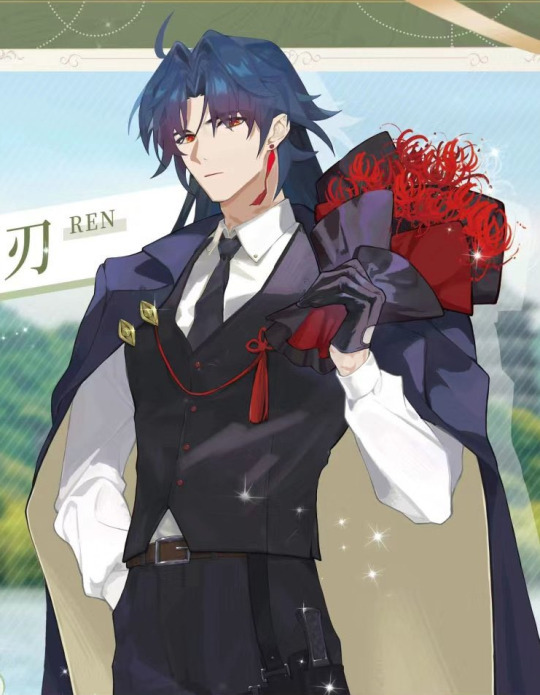
Thanks for the formal wear Blade, Mihoyo! Now do you mind if I just- *puts the trauma back on him*
#honkai star rail#hsr#hsr blade#blade hsr#very nice! you know what would be even nicer? some scars#*opens photoshop*#this is the height of I CAN DO WHAT I WANT and what i want is visibly scarred blade#this doesn't show much skin but it shows more than his usual outfit#so i consider it free real estate to add scars in areas that are usually covered#namely the lower part of his neck and his wrist#thank you psy for that caption that made me laugh#put the trauma back on this man#i refuse to believe he has the skill or the interest to cover them with makeup#also i personally want to see scars so i'm making them happen#mihoyo isn't my boss they can't stop me#ray's records
56 notes
·
View notes
Text
(on that note i'm finally getting to watching the cast oneshot on high rollers and whoo boy)
(i might need to move my wyllmance playthrough up the line a smidge)
(i was gonna go with my cringefail loser "abolutely no rerolls for any reason" ranger and then my dark urge next but.... yknow? what can i say.)
#squirrel plays bg3#ray might need to be moved up the line#though i think if he stays where he is he'll be my hardmode game just to keep it fine fresh and zesty#arvid “let's play the game as we naturally would!” trygg#iona “let's exhaust all the content we possibly can and find all the secrets ever!” raedir#petyr “what happens when you actively fucking suck at- and ON everything” wildbrook#mara “i'm three days old and all i know is murder what is going on i don't even have a last name”#raymond “well slap my thrice-blessed lily-white asscheeks and call me a bronto; here we go again I fucking guess” trevelyan#phyridia “i also fucked a god and have a city for a last name gale you're not that special” of warford
12 notes
·
View notes
Text
"you're home." he murmurs, eye of moonshine glazed with emotion.
my own vision turns to a blur. "i'm home, kaeya."
#now that i know one hundred percent that it's over#KAEYA ALBERICH THE MAN THAT YOU ARE#CHANGING MY NAME TO MIKA ALBERICH#I LOVE YOU TO THE MOON AND BACK#I'D BRAVE STORMS TO GET BACK TO YOU#and also#frick itto rajma chawal is amazing#BEAAAANSSSSSSSSSSSSSSSSSSSSSSSSSSSSSSSSS#anyway.#KAEYA ALBERICH YOU HAVE MY HEART AND MY SOUL#i'd say something poetic but the brain is not braining#without him my soul is scattered; he holds me together#that'll do#BUT HE'S SO HUSBAND#ON MY KNEES#you may wield powers of ice but you melt my heart like the rays of the sun
7 notes
·
View notes
Text
i keep being like "you are on HIATUS stop checking TUMBLR" but then i keep coming back ever since getting bg3 because I'm like "i need to see what the besties are saying about our dear vampire and also see if folks have stopped sleeping on my darling wyll yet" help i am being consumed by the brainrot
#august rambles#bg3 tickling#i am not romancing astarion yet but i WILL i know i can fix him -- no matter how many times @achilleean yells “NO” at me when i say it lol#but i am romancing wyll on my first playthrough i adore him. but he is killing me with this slow burn#wyll i have either been propositioned by or had to dance out of flirtatious situations with literally everyone else in this camp!!!!!!#stop trying to flirt with lae'zel and shadowheart and make your move on the person paying attention to you already!!!! i am suffering#yes i am in act 1. i only have like 40 or so hours logged#but. my tfb besties. pls stop sleeping on wyll baby boy is LITERALLY wearing a crop top around camp every single night PLEASE#he is a walking ray of sunshine he is my sweet golden retriever he is good with kids and likes helping people#WYLL HAS SUCH A NICE SMILE AND VOICE please i need everyone to love him as much as i do#i hope this post does not breach tfb containment after how many npc name drops i have done lol i am the Nervous
16 notes
·
View notes